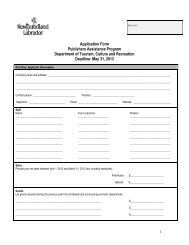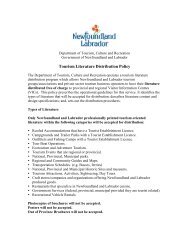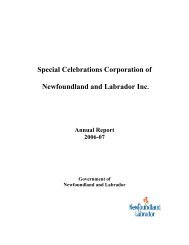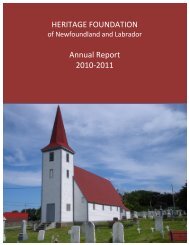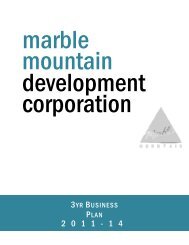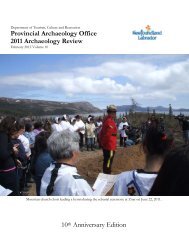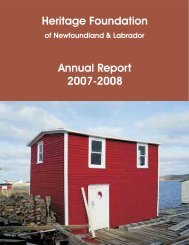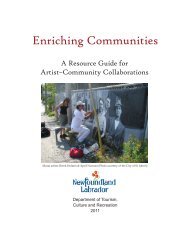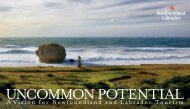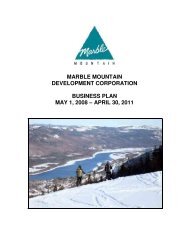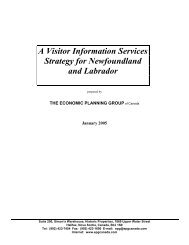- Page 4 and 5: Table of ContentsPage No.Section 3
- Page 6 and 7: Table of ContentsPage No.Section 6:
- Page 8 and 9: Table of ContentsPage No.Section 9
- Page 10 and 11: Table of ContentsPage No.Section 13
- Page 12 and 13: Table of ContentsPage No.Section 17
- Page 14 and 15: The Top Ten Conclusions (continued)
- Page 16 and 17: Section 1IntroductionTHE ECONOMIC P
- Page 18 and 19: - 2 -Objectives and Scope of the St
- Page 20 and 21: - 4 -" Preparation of several backg
- Page 24 and 25: - 7 -There are expectations that th
- Page 26 and 27: - 9 -A recent National Geographic T
- Page 28 and 29: - 11-“changes to exchange rates a
- Page 30 and 31: - 13-• Family (41%)• Learning (
- Page 32 and 33: Section 3Situational AnalysisTHE EC
- Page 34 and 35: - 16 -o Outdoor activities availabl
- Page 36 and 37: - 18 -The province’s tourism prod
- Page 38 and 39: - 20 -Market perspectives on Newfou
- Page 40 and 41: - 22 -o Transportation to and from
- Page 42 and 43: - 24 -Exhibit 1Satisfaction Levels
- Page 44 and 45: - 26 -RoofedAccommodationsSupply of
- Page 46 and 47: - 28 -Nova Scotia and Prince Edward
- Page 48 and 49: - 30 -Hotel/Motel Occupancy by Star
- Page 50 and 51: - 32 -o There are examples of rooms
- Page 52 and 53: - 34 -pricing, rate structures, dis
- Page 54 and 55: - 36 -A few participants reported s
- Page 56 and 57: - 38 -Exhibit 2Extent to which Acco
- Page 58 and 59: - 40 -Clearly the vast majority of
- Page 60 and 61: - 42 -o Growing use of upscale B&Bs
- Page 62 and 63: - 44 -o Not enough 4 star plus prop
- Page 64 and 65: - 46 -As illustrated in thegraph, t
- Page 66 and 67: - 48 -campsite. The rate for sites
- Page 68 and 69: - 50 -o There appears to be an incr
- Page 70 and 71: - 52 -A niche market within the rec
- Page 72 and 73:
- 54 -Argentia facility closes at t
- Page 74 and 75:
- 56 -expressed views concerned sig
- Page 76 and 77:
- 58 -The Department of Tourism, Cu
- Page 78 and 79:
- 60 -the province was about 48% hi
- Page 80 and 81:
- 62 -A related issue is recreation
- Page 82 and 83:
- 64 -HNL also offers a wide range
- Page 84 and 85:
- 66 -" Its core programs include:-
- Page 86 and 87:
- 68 -Federal Government ProgramsAt
- Page 88 and 89:
- 70 -The tourism industry in Newfo
- Page 90 and 91:
Section 4Product Development Initia
- Page 92 and 93:
- 73 -Key Issues/Opportunities/Chal
- Page 94 and 95:
- 75 -Key Issues/ Opportunities/ Ch
- Page 96 and 97:
- 77 -o Product Committee scans cur
- Page 98 and 99:
- 79 -o Development of mutual respe
- Page 100 and 101:
- 81 -The province has recently int
- Page 102 and 103:
- 83 -One of the signature areas id
- Page 104 and 105:
- 85 -o Ontario’s Product Allianc
- Page 106 and 107:
Section 5Overall Strategic Approach
- Page 108 and 109:
- 88-This is not to suggest that we
- Page 110 and 111:
- 90-Newfoundland’s major tourist
- Page 112 and 113:
- 92-Federal government:o National
- Page 114 and 115:
- 94-The approach focuses on buildi
- Page 116 and 117:
- 96-on its investment. The $300 mi
- Page 118 and 119:
Section 6Strengthening and Building
- Page 120 and 121:
- 99 -Demand Influencers - Natural
- Page 122 and 123:
Exhibit 4Evaluation of Attractions,
- Page 124 and 125:
- 103-Top Priority Influencers (10
- Page 126 and 127:
- 105-Exhibit 5Rating of Potential
- Page 128 and 129:
- 107-Based on this evaluation, act
- Page 130 and 131:
- 109-o Staging a spring or fall ev
- Page 132 and 133:
- 111-1. Develop pricing ‘tools
- Page 134 and 135:
- 113-Cultural and Heritage Attract
- Page 136 and 137:
- 115-o Exhibit 7What Does ‘Cultu
- Page 138 and 139:
- 117-There are always risks in con
- Page 140 and 141:
- 119-Aboriginal and Acadian Cultur
- Page 142 and 143:
- 121-Criteria for SupportThe kinds
- Page 144 and 145:
- 123-Other Provincial Initiatives
- Page 146 and 147:
- 125-The question arises, however,
- Page 148 and 149:
- 127-Provincial/Regional Itinerari
- Page 150 and 151:
- 129-o A serious shortage of renta
- Page 152 and 153:
- 131-This is another sector of the
- Page 154 and 155:
- 133-Walking and hiking is one of
- Page 156 and 157:
- 135-The Green Bay Trail Guide pro
- Page 158 and 159:
- 137-get them developed. We have n
- Page 160 and 161:
- 138 -Section 7Strengthening and B
- Page 163:
- 140 -Established Destination Area
- Page 166 and 167:
- 143 -Some suggestions:o Build on
- Page 168 and 169:
- 144 -Section 8Strengthening Touri
- Page 170 and 171:
- 146 -Currently established servic
- Page 172 and 173:
- 148 -o The absence of Provincial
- Page 174 and 175:
Section 9Strategies for Accommodati
- Page 176 and 177:
- 151 -But with demand generating a
- Page 178 and 179:
- 153 -To be more explicit, the nee
- Page 180 and 181:
- 155 -to assess this. What occupan
- Page 182 and 183:
- 157 -o Has evident potential in o
- Page 184 and 185:
- 159 -o Accessible by roado Archit
- Page 186 and 187:
- 161 -of a feasible proposal by th
- Page 188 and 189:
- 163 -The criteria here are relati
- Page 190 and 191:
- 165 -significant gaps, such that
- Page 192 and 193:
- 167 -We have used scores of low,
- Page 194 and 195:
- 169 -o Also, some level operating
- Page 196 and 197:
- 171 -Preference should be given t
- Page 198 and 199:
- 173 -If this sort of advice is to
- Page 200 and 201:
- 175 -some suggestions that the da
- Page 202 and 203:
- 177 -only be given in destination
- Page 204 and 205:
Section 10Other Product Development
- Page 206 and 207:
- 180 -As part of the shoulder and
- Page 208 and 209:
- 182 -flexibility in this regard.
- Page 210 and 211:
- 184 -from this process has been s
- Page 212 and 213:
Section 11Strategies for Market Rea
- Page 214 and 215:
- 187 -o Brochure and other marketi
- Page 216 and 217:
- 189 -considered in the mystery sh
- Page 218 and 219:
- 191 -them of the career opportuni
- Page 220 and 221:
- 192 -Section 12LabradorOverviewLa
- Page 222 and 223:
- 194 -Tourism Business Support Fun
- Page 224 and 225:
- 196 -" Principles and policies fo
- Page 226 and 227:
- 198 -Changes Since Completion of
- Page 228 and 229:
- 200 -are currently looking at the
- Page 230 and 231:
- 202 -development of the Labrador
- Page 232 and 233:
- 204 -" Identify Business and Prod
- Page 234 and 235:
- 206 -" Some have been long-held f
- Page 236 and 237:
Section 13ImplementationTHE ECONOMI
- Page 238 and 239:
- 209 -barrel for government handou
- Page 240 and 241:
- 211 -In the second case, the appr
- Page 242 and 243:
- 213 -General ConclusionsOther con
- Page 244 and 245:
- 215 -o Econo-museum/learning prog
- Page 246 and 247:
- 217 -across the province - museum
- Page 248 and 249:
- 219 -Newfoundland and Labrador To
- Page 250 and 251:
- 221 -Exhibit 11Functions of the A
- Page 252 and 253:
- 223 -The challenge here is the ne
- Page 254 and 255:
- 225 -The first iteration of the a
- Page 256 and 257:
- 227 -other organizations the team
- Page 258 and 259:
- 229 -Given the kind of budget req
- Page 260 and 261:
- 231 -FundingWe recommend that the
- Page 262 and 263:
- 233 -Linkage with the Tourism Mar
- Page 264 and 265:
- 235 -Hospitality Newfoundland and
- Page 266 and 267:
PART IIOpportunities for Product De
- Page 268 and 269:
- 237 -Section 14Avalon RegionOverv
- Page 270 and 271:
- 239 -Exhibit 13Avalon Region - Oc
- Page 272:
- 241 -Destination AreasThe discuss
- Page 275 and 276:
- 244 -believes that there is an op
- Page 277 and 278:
- 246 -of those interview indicated
- Page 279 and 280:
- 248 -Opportunities and NeedsPoten
- Page 281 and 282:
- 250 -Opportunities and NeedsWith
- Page 283 and 284:
- 252 -Zone 17:Mariner (Baccalieu T
- Page 285 and 286:
Section 15Eastern RegionTHE ECONOMI
- Page 287 and 288:
- 255 -EASTERN REGIONNumber Number
- Page 290 and 291:
- 258 -Trinity Bight (Trinity/Port
- Page 292 and 293:
- 260 -Accommodation Supply, Demand
- Page 294 and 295:
- 262 -Opportunities and NeedsThe p
- Page 296 and 297:
- 264 -° The fall season of Rising
- Page 298 and 299:
- 265 -Section 16Central RegionOver
- Page 300:
- 267 -perform better than the lowe
- Page 303 and 304:
- 270 -Suggested Tourism Developmen
- Page 305 and 306:
- 272 -primarily of the hotel/motel
- Page 307 and 308:
- 274 -but demand outside this peri
- Page 309 and 310:
- 276 -Demand° Overall occupancies
- Page 311 and 312:
- 278 -100%90%80%70%60%50%40%30%20%
- Page 313 and 314:
- 280 -100%90%80%70%60%50%40%30%20%
- Page 315 and 316:
- 281 -Section 17Western RegionOver
- Page 317:
- 283 -Destination AreasThe discuss
- Page 320 and 321:
- 286 -° Raleigh - consider propos
- Page 322 and 323:
- 288 -Codroy Valley/Southwest Coas
- Page 324 and 325:
Demand- 290 -ZONE 6 - NordicNumber
- Page 326 and 327:
- 292 -ooGMNP, this is a significan
- Page 328 and 329:
- 294 -Demandoo100%90%80%70%60%50%4
- Page 330 and 331:
- 296 -oThere may be some future op
- Page 332 and 333:
Section 18Labrador Accommodation As
- Page 334 and 335:
- 299 -Supply of Accommodations in
- Page 336:
- 301 -100%90%80%70%60%50%40%30%20%
- Page 339 and 340:
- 303 -Zone 5: Labrador StraitsSupp
- Page 341 and 342:
- 305 -As with Zone 4, activity in
- Page 343 and 344:
Qualmark - New Zealand's official q
- Page 345 and 346:
Qualmark - New Zealand's official q
- Page 347 and 348:
Qualmark - New Zealand's official q
- Page 349 and 350:
Qualmark - New Zealand's official q
- Page 351 and 352:
- i -Appendix IIOther Tourism Proje
- Page 353 and 354:
- iii -Change and Fogo Islands - Th
- Page 355:
Appendix IIIMap of Regional Economi
- Page 358 and 359:
- 1 -Appendix IVGlossary of TermsAC
- Page 360 and 361:
- 3 -Geographic Markets: Market seg
- Page 362 and 363:
- 5 -Regional DMO: Regional destina




